Taxation Theory, Practice & Law Assignment - T2 2019, Holmes Institute
VerifiedAdded on 2022/12/14
|7
|2431
|450
Homework Assignment
AI Summary
This assignment solution addresses two key taxation issues. The first part analyzes the GST input tax credit available to a property development company (City Sky Co) based on Australian Taxation Office (ATO) regulations, considering legal fees incurred for property development. The second part focuses on an individual's income tax return, examining capital gains tax (CGT) implications from the sale of land, shares, a stamp collection, and a grand piano, considering relevant ATO guidelines, including those for personal use assets and collectibles. The solution provides detailed analysis, applying tax principles to real-life scenarios, interpreting relevant legislation, and providing conclusions for each issue.
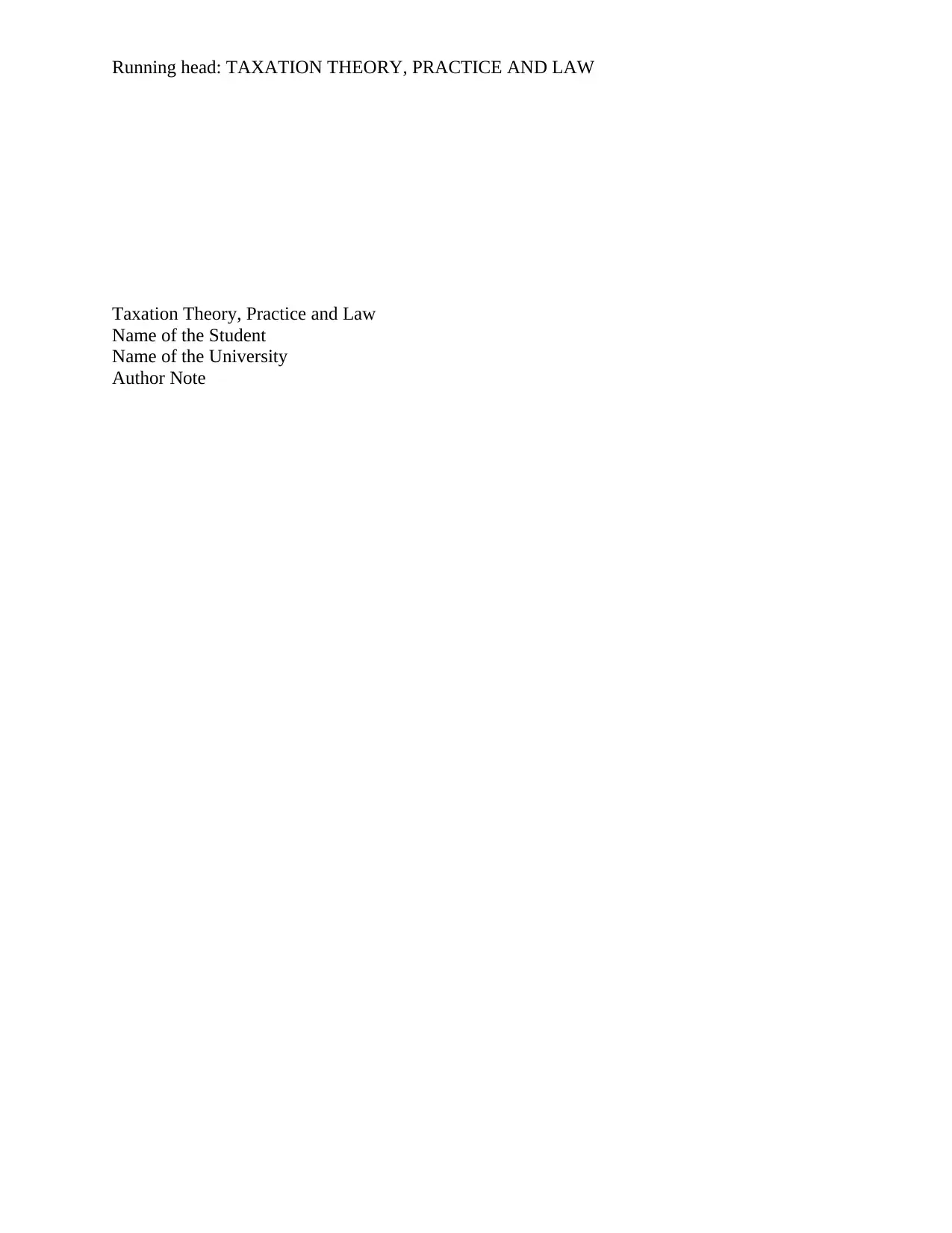
Running head: TAXATION THEORY, PRACTICE AND LAW
Taxation Theory, Practice and Law
Name of the Student
Name of the University
Author Note
Taxation Theory, Practice and Law
Name of the Student
Name of the University
Author Note
Paraphrase This Document
Need a fresh take? Get an instant paraphrase of this document with our AI Paraphraser
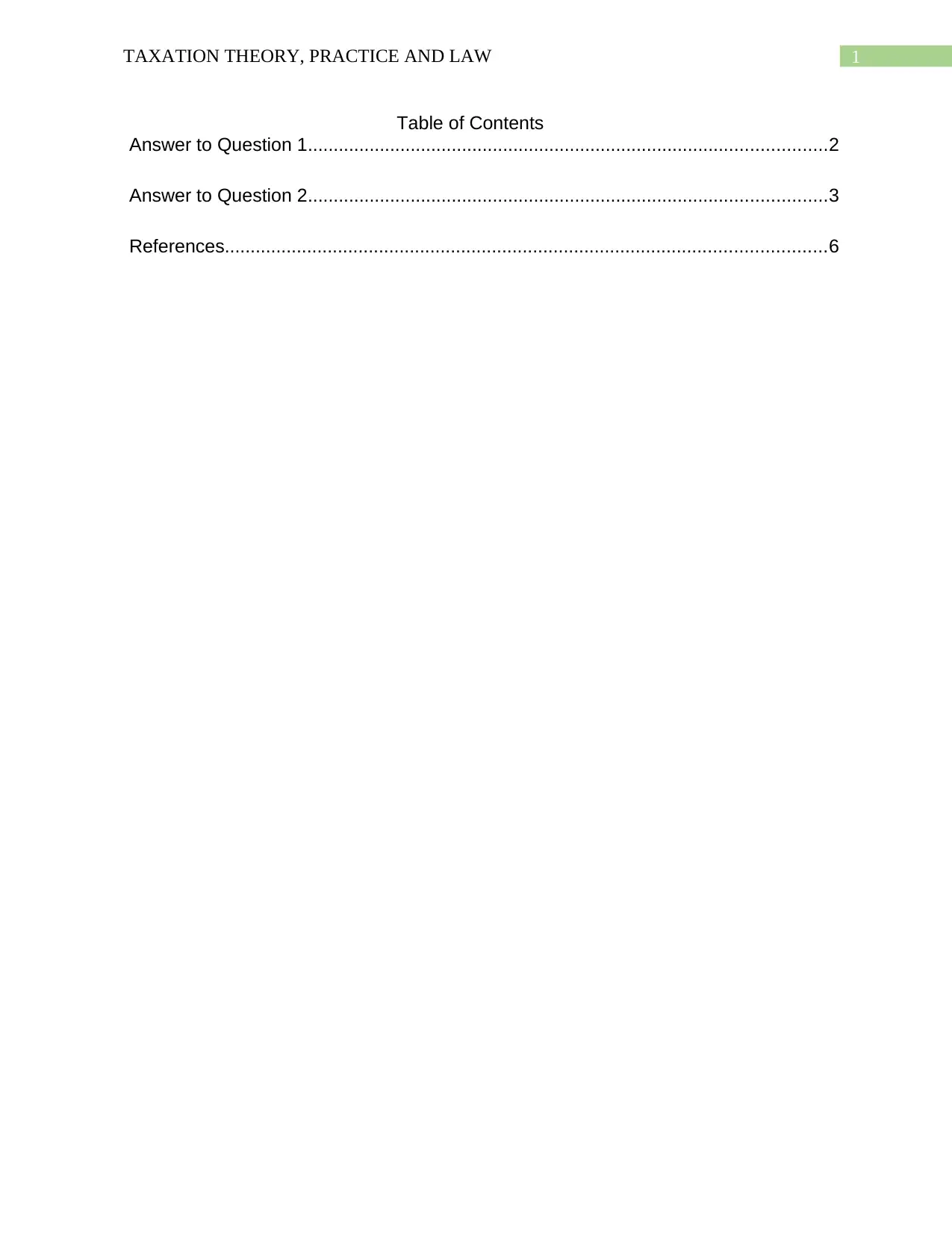
1TAXATION THEORY, PRACTICE AND LAW
Table of Contents
Answer to Question 1.....................................................................................................2
Answer to Question 2.....................................................................................................3
References.....................................................................................................................6
Table of Contents
Answer to Question 1.....................................................................................................2
Answer to Question 2.....................................................................................................3
References.....................................................................................................................6
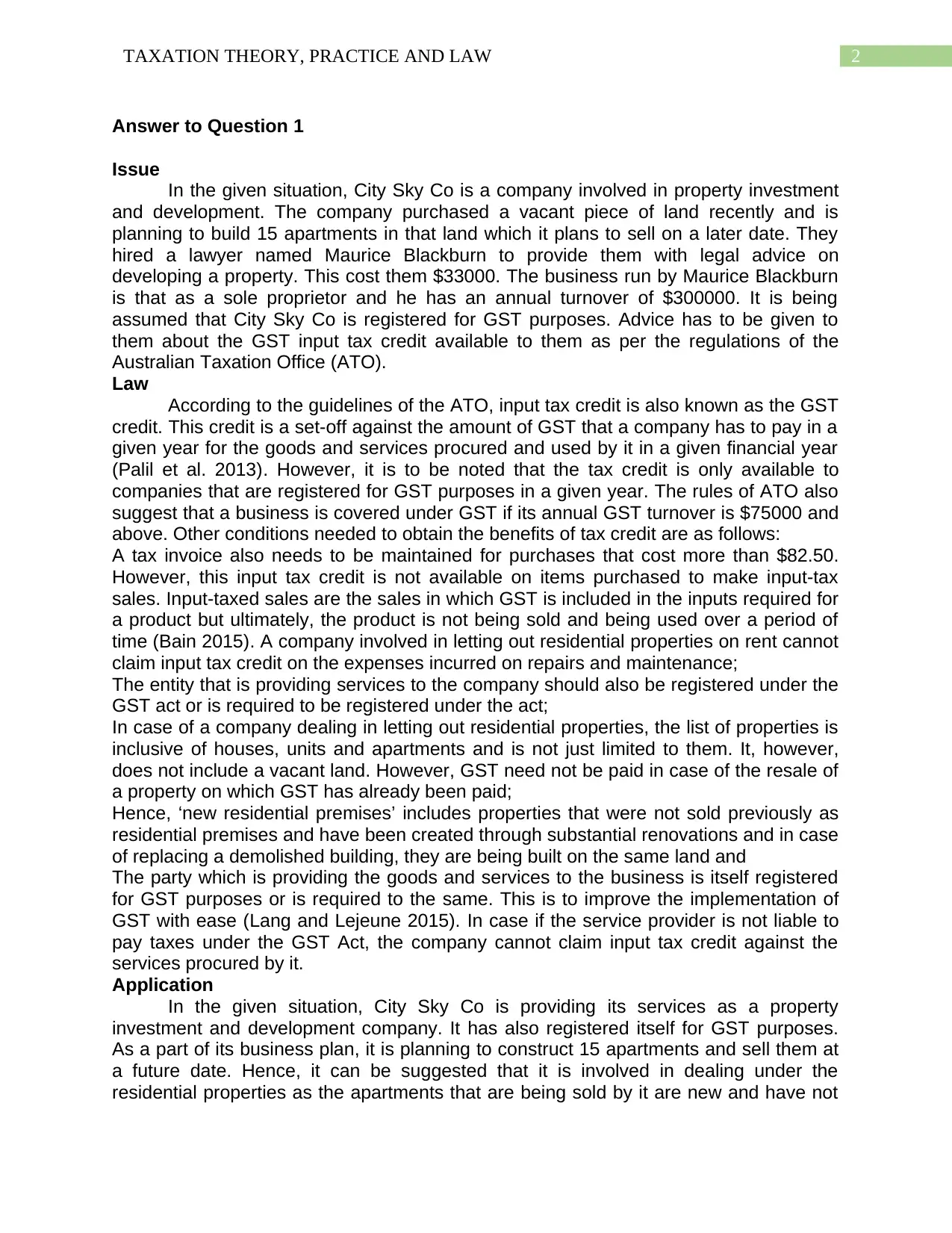
2TAXATION THEORY, PRACTICE AND LAW
Answer to Question 1
Issue
In the given situation, City Sky Co is a company involved in property investment
and development. The company purchased a vacant piece of land recently and is
planning to build 15 apartments in that land which it plans to sell on a later date. They
hired a lawyer named Maurice Blackburn to provide them with legal advice on
developing a property. This cost them $33000. The business run by Maurice Blackburn
is that as a sole proprietor and he has an annual turnover of $300000. It is being
assumed that City Sky Co is registered for GST purposes. Advice has to be given to
them about the GST input tax credit available to them as per the regulations of the
Australian Taxation Office (ATO).
Law
According to the guidelines of the ATO, input tax credit is also known as the GST
credit. This credit is a set-off against the amount of GST that a company has to pay in a
given year for the goods and services procured and used by it in a given financial year
(Palil et al. 2013). However, it is to be noted that the tax credit is only available to
companies that are registered for GST purposes in a given year. The rules of ATO also
suggest that a business is covered under GST if its annual GST turnover is $75000 and
above. Other conditions needed to obtain the benefits of tax credit are as follows:
A tax invoice also needs to be maintained for purchases that cost more than $82.50.
However, this input tax credit is not available on items purchased to make input-tax
sales. Input-taxed sales are the sales in which GST is included in the inputs required for
a product but ultimately, the product is not being sold and being used over a period of
time (Bain 2015). A company involved in letting out residential properties on rent cannot
claim input tax credit on the expenses incurred on repairs and maintenance;
The entity that is providing services to the company should also be registered under the
GST act or is required to be registered under the act;
In case of a company dealing in letting out residential properties, the list of properties is
inclusive of houses, units and apartments and is not just limited to them. It, however,
does not include a vacant land. However, GST need not be paid in case of the resale of
a property on which GST has already been paid;
Hence, ‘new residential premises’ includes properties that were not sold previously as
residential premises and have been created through substantial renovations and in case
of replacing a demolished building, they are being built on the same land and
The party which is providing the goods and services to the business is itself registered
for GST purposes or is required to the same. This is to improve the implementation of
GST with ease (Lang and Lejeune 2015). In case if the service provider is not liable to
pay taxes under the GST Act, the company cannot claim input tax credit against the
services procured by it.
Application
In the given situation, City Sky Co is providing its services as a property
investment and development company. It has also registered itself for GST purposes.
As a part of its business plan, it is planning to construct 15 apartments and sell them at
a future date. Hence, it can be suggested that it is involved in dealing under the
residential properties as the apartments that are being sold by it are new and have not
Answer to Question 1
Issue
In the given situation, City Sky Co is a company involved in property investment
and development. The company purchased a vacant piece of land recently and is
planning to build 15 apartments in that land which it plans to sell on a later date. They
hired a lawyer named Maurice Blackburn to provide them with legal advice on
developing a property. This cost them $33000. The business run by Maurice Blackburn
is that as a sole proprietor and he has an annual turnover of $300000. It is being
assumed that City Sky Co is registered for GST purposes. Advice has to be given to
them about the GST input tax credit available to them as per the regulations of the
Australian Taxation Office (ATO).
Law
According to the guidelines of the ATO, input tax credit is also known as the GST
credit. This credit is a set-off against the amount of GST that a company has to pay in a
given year for the goods and services procured and used by it in a given financial year
(Palil et al. 2013). However, it is to be noted that the tax credit is only available to
companies that are registered for GST purposes in a given year. The rules of ATO also
suggest that a business is covered under GST if its annual GST turnover is $75000 and
above. Other conditions needed to obtain the benefits of tax credit are as follows:
A tax invoice also needs to be maintained for purchases that cost more than $82.50.
However, this input tax credit is not available on items purchased to make input-tax
sales. Input-taxed sales are the sales in which GST is included in the inputs required for
a product but ultimately, the product is not being sold and being used over a period of
time (Bain 2015). A company involved in letting out residential properties on rent cannot
claim input tax credit on the expenses incurred on repairs and maintenance;
The entity that is providing services to the company should also be registered under the
GST act or is required to be registered under the act;
In case of a company dealing in letting out residential properties, the list of properties is
inclusive of houses, units and apartments and is not just limited to them. It, however,
does not include a vacant land. However, GST need not be paid in case of the resale of
a property on which GST has already been paid;
Hence, ‘new residential premises’ includes properties that were not sold previously as
residential premises and have been created through substantial renovations and in case
of replacing a demolished building, they are being built on the same land and
The party which is providing the goods and services to the business is itself registered
for GST purposes or is required to the same. This is to improve the implementation of
GST with ease (Lang and Lejeune 2015). In case if the service provider is not liable to
pay taxes under the GST Act, the company cannot claim input tax credit against the
services procured by it.
Application
In the given situation, City Sky Co is providing its services as a property
investment and development company. It has also registered itself for GST purposes.
As a part of its business plan, it is planning to construct 15 apartments and sell them at
a future date. Hence, it can be suggested that it is involved in dealing under the
residential properties as the apartments that are being sold by it are new and have not
⊘ This is a preview!⊘
Do you want full access?
Subscribe today to unlock all pages.

Trusted by 1+ million students worldwide
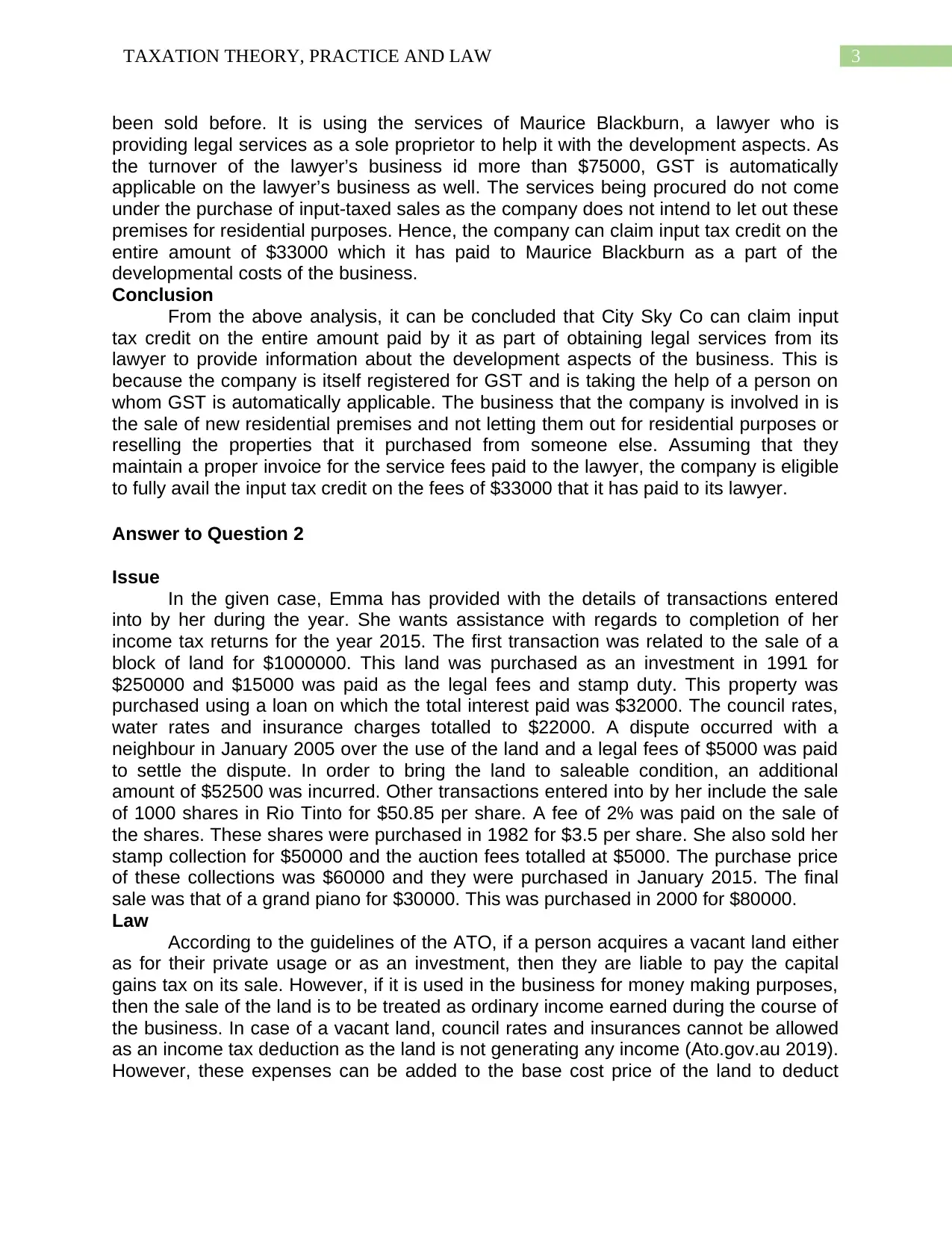
3TAXATION THEORY, PRACTICE AND LAW
been sold before. It is using the services of Maurice Blackburn, a lawyer who is
providing legal services as a sole proprietor to help it with the development aspects. As
the turnover of the lawyer’s business id more than $75000, GST is automatically
applicable on the lawyer’s business as well. The services being procured do not come
under the purchase of input-taxed sales as the company does not intend to let out these
premises for residential purposes. Hence, the company can claim input tax credit on the
entire amount of $33000 which it has paid to Maurice Blackburn as a part of the
developmental costs of the business.
Conclusion
From the above analysis, it can be concluded that City Sky Co can claim input
tax credit on the entire amount paid by it as part of obtaining legal services from its
lawyer to provide information about the development aspects of the business. This is
because the company is itself registered for GST and is taking the help of a person on
whom GST is automatically applicable. The business that the company is involved in is
the sale of new residential premises and not letting them out for residential purposes or
reselling the properties that it purchased from someone else. Assuming that they
maintain a proper invoice for the service fees paid to the lawyer, the company is eligible
to fully avail the input tax credit on the fees of $33000 that it has paid to its lawyer.
Answer to Question 2
Issue
In the given case, Emma has provided with the details of transactions entered
into by her during the year. She wants assistance with regards to completion of her
income tax returns for the year 2015. The first transaction was related to the sale of a
block of land for $1000000. This land was purchased as an investment in 1991 for
$250000 and $15000 was paid as the legal fees and stamp duty. This property was
purchased using a loan on which the total interest paid was $32000. The council rates,
water rates and insurance charges totalled to $22000. A dispute occurred with a
neighbour in January 2005 over the use of the land and a legal fees of $5000 was paid
to settle the dispute. In order to bring the land to saleable condition, an additional
amount of $52500 was incurred. Other transactions entered into by her include the sale
of 1000 shares in Rio Tinto for $50.85 per share. A fee of 2% was paid on the sale of
the shares. These shares were purchased in 1982 for $3.5 per share. She also sold her
stamp collection for $50000 and the auction fees totalled at $5000. The purchase price
of these collections was $60000 and they were purchased in January 2015. The final
sale was that of a grand piano for $30000. This was purchased in 2000 for $80000.
Law
According to the guidelines of the ATO, if a person acquires a vacant land either
as for their private usage or as an investment, then they are liable to pay the capital
gains tax on its sale. However, if it is used in the business for money making purposes,
then the sale of the land is to be treated as ordinary income earned during the course of
the business. In case of a vacant land, council rates and insurances cannot be allowed
as an income tax deduction as the land is not generating any income (Ato.gov.au 2019).
However, these expenses can be added to the base cost price of the land to deduct
been sold before. It is using the services of Maurice Blackburn, a lawyer who is
providing legal services as a sole proprietor to help it with the development aspects. As
the turnover of the lawyer’s business id more than $75000, GST is automatically
applicable on the lawyer’s business as well. The services being procured do not come
under the purchase of input-taxed sales as the company does not intend to let out these
premises for residential purposes. Hence, the company can claim input tax credit on the
entire amount of $33000 which it has paid to Maurice Blackburn as a part of the
developmental costs of the business.
Conclusion
From the above analysis, it can be concluded that City Sky Co can claim input
tax credit on the entire amount paid by it as part of obtaining legal services from its
lawyer to provide information about the development aspects of the business. This is
because the company is itself registered for GST and is taking the help of a person on
whom GST is automatically applicable. The business that the company is involved in is
the sale of new residential premises and not letting them out for residential purposes or
reselling the properties that it purchased from someone else. Assuming that they
maintain a proper invoice for the service fees paid to the lawyer, the company is eligible
to fully avail the input tax credit on the fees of $33000 that it has paid to its lawyer.
Answer to Question 2
Issue
In the given case, Emma has provided with the details of transactions entered
into by her during the year. She wants assistance with regards to completion of her
income tax returns for the year 2015. The first transaction was related to the sale of a
block of land for $1000000. This land was purchased as an investment in 1991 for
$250000 and $15000 was paid as the legal fees and stamp duty. This property was
purchased using a loan on which the total interest paid was $32000. The council rates,
water rates and insurance charges totalled to $22000. A dispute occurred with a
neighbour in January 2005 over the use of the land and a legal fees of $5000 was paid
to settle the dispute. In order to bring the land to saleable condition, an additional
amount of $52500 was incurred. Other transactions entered into by her include the sale
of 1000 shares in Rio Tinto for $50.85 per share. A fee of 2% was paid on the sale of
the shares. These shares were purchased in 1982 for $3.5 per share. She also sold her
stamp collection for $50000 and the auction fees totalled at $5000. The purchase price
of these collections was $60000 and they were purchased in January 2015. The final
sale was that of a grand piano for $30000. This was purchased in 2000 for $80000.
Law
According to the guidelines of the ATO, if a person acquires a vacant land either
as for their private usage or as an investment, then they are liable to pay the capital
gains tax on its sale. However, if it is used in the business for money making purposes,
then the sale of the land is to be treated as ordinary income earned during the course of
the business. In case of a vacant land, council rates and insurances cannot be allowed
as an income tax deduction as the land is not generating any income (Ato.gov.au 2019).
However, these expenses can be added to the base cost price of the land to deduct
Paraphrase This Document
Need a fresh take? Get an instant paraphrase of this document with our AI Paraphraser
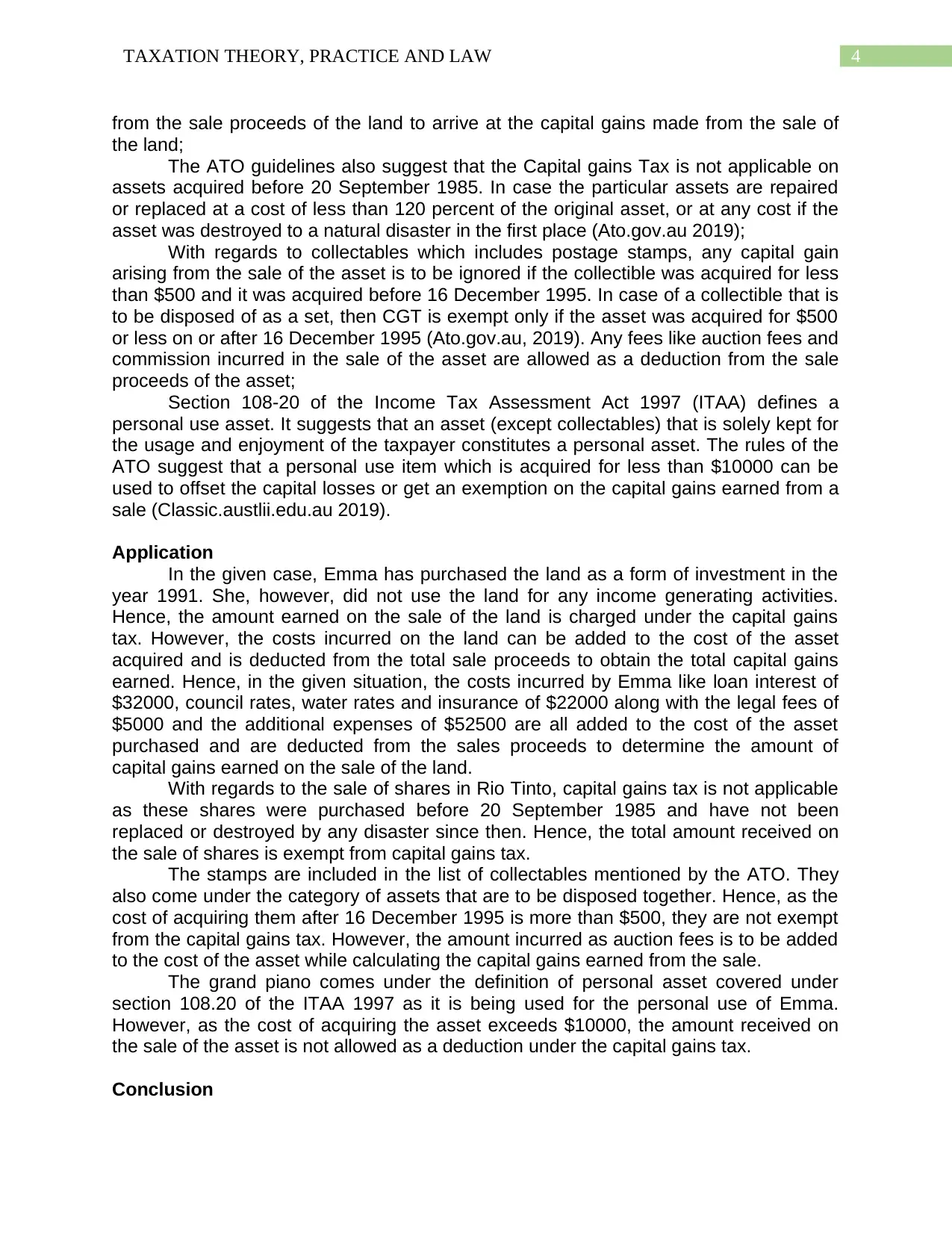
4TAXATION THEORY, PRACTICE AND LAW
from the sale proceeds of the land to arrive at the capital gains made from the sale of
the land;
The ATO guidelines also suggest that the Capital gains Tax is not applicable on
assets acquired before 20 September 1985. In case the particular assets are repaired
or replaced at a cost of less than 120 percent of the original asset, or at any cost if the
asset was destroyed to a natural disaster in the first place (Ato.gov.au 2019);
With regards to collectables which includes postage stamps, any capital gain
arising from the sale of the asset is to be ignored if the collectible was acquired for less
than $500 and it was acquired before 16 December 1995. In case of a collectible that is
to be disposed of as a set, then CGT is exempt only if the asset was acquired for $500
or less on or after 16 December 1995 (Ato.gov.au, 2019). Any fees like auction fees and
commission incurred in the sale of the asset are allowed as a deduction from the sale
proceeds of the asset;
Section 108-20 of the Income Tax Assessment Act 1997 (ITAA) defines a
personal use asset. It suggests that an asset (except collectables) that is solely kept for
the usage and enjoyment of the taxpayer constitutes a personal asset. The rules of the
ATO suggest that a personal use item which is acquired for less than $10000 can be
used to offset the capital losses or get an exemption on the capital gains earned from a
sale (Classic.austlii.edu.au 2019).
Application
In the given case, Emma has purchased the land as a form of investment in the
year 1991. She, however, did not use the land for any income generating activities.
Hence, the amount earned on the sale of the land is charged under the capital gains
tax. However, the costs incurred on the land can be added to the cost of the asset
acquired and is deducted from the total sale proceeds to obtain the total capital gains
earned. Hence, in the given situation, the costs incurred by Emma like loan interest of
$32000, council rates, water rates and insurance of $22000 along with the legal fees of
$5000 and the additional expenses of $52500 are all added to the cost of the asset
purchased and are deducted from the sales proceeds to determine the amount of
capital gains earned on the sale of the land.
With regards to the sale of shares in Rio Tinto, capital gains tax is not applicable
as these shares were purchased before 20 September 1985 and have not been
replaced or destroyed by any disaster since then. Hence, the total amount received on
the sale of shares is exempt from capital gains tax.
The stamps are included in the list of collectables mentioned by the ATO. They
also come under the category of assets that are to be disposed together. Hence, as the
cost of acquiring them after 16 December 1995 is more than $500, they are not exempt
from the capital gains tax. However, the amount incurred as auction fees is to be added
to the cost of the asset while calculating the capital gains earned from the sale.
The grand piano comes under the definition of personal asset covered under
section 108.20 of the ITAA 1997 as it is being used for the personal use of Emma.
However, as the cost of acquiring the asset exceeds $10000, the amount received on
the sale of the asset is not allowed as a deduction under the capital gains tax.
Conclusion
from the sale proceeds of the land to arrive at the capital gains made from the sale of
the land;
The ATO guidelines also suggest that the Capital gains Tax is not applicable on
assets acquired before 20 September 1985. In case the particular assets are repaired
or replaced at a cost of less than 120 percent of the original asset, or at any cost if the
asset was destroyed to a natural disaster in the first place (Ato.gov.au 2019);
With regards to collectables which includes postage stamps, any capital gain
arising from the sale of the asset is to be ignored if the collectible was acquired for less
than $500 and it was acquired before 16 December 1995. In case of a collectible that is
to be disposed of as a set, then CGT is exempt only if the asset was acquired for $500
or less on or after 16 December 1995 (Ato.gov.au, 2019). Any fees like auction fees and
commission incurred in the sale of the asset are allowed as a deduction from the sale
proceeds of the asset;
Section 108-20 of the Income Tax Assessment Act 1997 (ITAA) defines a
personal use asset. It suggests that an asset (except collectables) that is solely kept for
the usage and enjoyment of the taxpayer constitutes a personal asset. The rules of the
ATO suggest that a personal use item which is acquired for less than $10000 can be
used to offset the capital losses or get an exemption on the capital gains earned from a
sale (Classic.austlii.edu.au 2019).
Application
In the given case, Emma has purchased the land as a form of investment in the
year 1991. She, however, did not use the land for any income generating activities.
Hence, the amount earned on the sale of the land is charged under the capital gains
tax. However, the costs incurred on the land can be added to the cost of the asset
acquired and is deducted from the total sale proceeds to obtain the total capital gains
earned. Hence, in the given situation, the costs incurred by Emma like loan interest of
$32000, council rates, water rates and insurance of $22000 along with the legal fees of
$5000 and the additional expenses of $52500 are all added to the cost of the asset
purchased and are deducted from the sales proceeds to determine the amount of
capital gains earned on the sale of the land.
With regards to the sale of shares in Rio Tinto, capital gains tax is not applicable
as these shares were purchased before 20 September 1985 and have not been
replaced or destroyed by any disaster since then. Hence, the total amount received on
the sale of shares is exempt from capital gains tax.
The stamps are included in the list of collectables mentioned by the ATO. They
also come under the category of assets that are to be disposed together. Hence, as the
cost of acquiring them after 16 December 1995 is more than $500, they are not exempt
from the capital gains tax. However, the amount incurred as auction fees is to be added
to the cost of the asset while calculating the capital gains earned from the sale.
The grand piano comes under the definition of personal asset covered under
section 108.20 of the ITAA 1997 as it is being used for the personal use of Emma.
However, as the cost of acquiring the asset exceeds $10000, the amount received on
the sale of the asset is not allowed as a deduction under the capital gains tax.
Conclusion
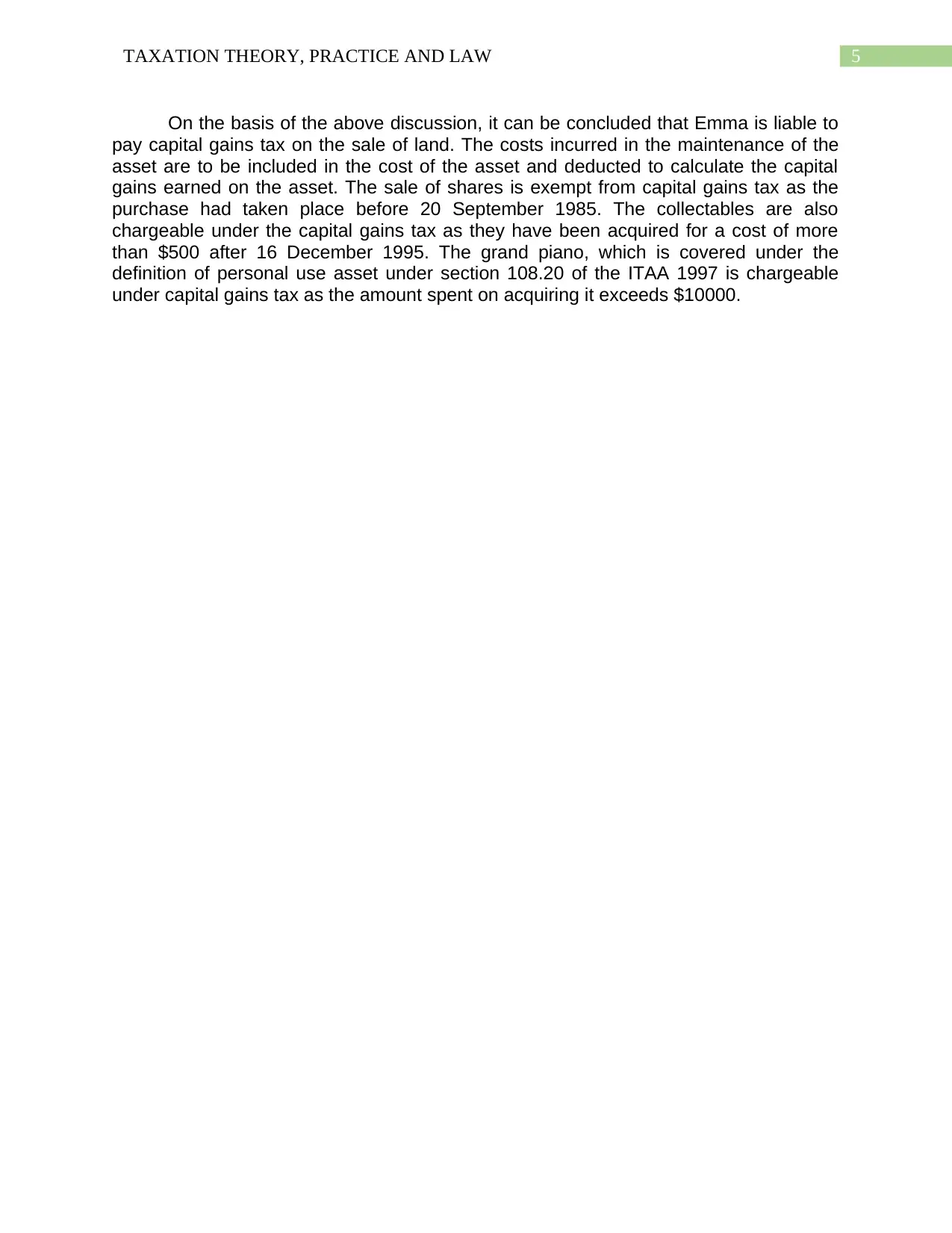
5TAXATION THEORY, PRACTICE AND LAW
On the basis of the above discussion, it can be concluded that Emma is liable to
pay capital gains tax on the sale of land. The costs incurred in the maintenance of the
asset are to be included in the cost of the asset and deducted to calculate the capital
gains earned on the asset. The sale of shares is exempt from capital gains tax as the
purchase had taken place before 20 September 1985. The collectables are also
chargeable under the capital gains tax as they have been acquired for a cost of more
than $500 after 16 December 1995. The grand piano, which is covered under the
definition of personal use asset under section 108.20 of the ITAA 1997 is chargeable
under capital gains tax as the amount spent on acquiring it exceeds $10000.
On the basis of the above discussion, it can be concluded that Emma is liable to
pay capital gains tax on the sale of land. The costs incurred in the maintenance of the
asset are to be included in the cost of the asset and deducted to calculate the capital
gains earned on the asset. The sale of shares is exempt from capital gains tax as the
purchase had taken place before 20 September 1985. The collectables are also
chargeable under the capital gains tax as they have been acquired for a cost of more
than $500 after 16 December 1995. The grand piano, which is covered under the
definition of personal use asset under section 108.20 of the ITAA 1997 is chargeable
under capital gains tax as the amount spent on acquiring it exceeds $10000.
⊘ This is a preview!⊘
Do you want full access?
Subscribe today to unlock all pages.

Trusted by 1+ million students worldwide
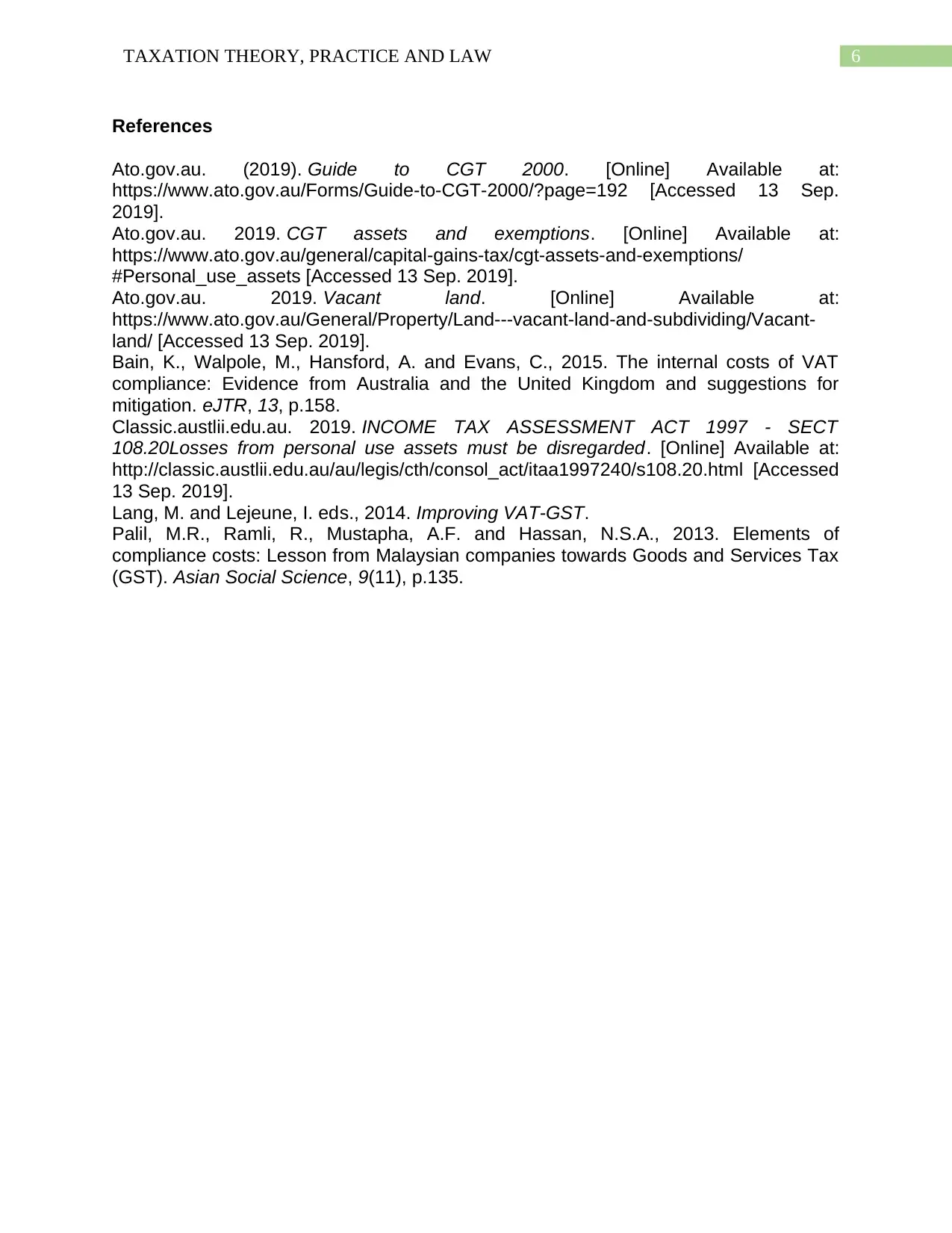
6TAXATION THEORY, PRACTICE AND LAW
References
Ato.gov.au. (2019). Guide to CGT 2000. [Online] Available at:
https://www.ato.gov.au/Forms/Guide-to-CGT-2000/?page=192 [Accessed 13 Sep.
2019].
Ato.gov.au. 2019. CGT assets and exemptions. [Online] Available at:
https://www.ato.gov.au/general/capital-gains-tax/cgt-assets-and-exemptions/
#Personal_use_assets [Accessed 13 Sep. 2019].
Ato.gov.au. 2019. Vacant land. [Online] Available at:
https://www.ato.gov.au/General/Property/Land---vacant-land-and-subdividing/Vacant-
land/ [Accessed 13 Sep. 2019].
Bain, K., Walpole, M., Hansford, A. and Evans, C., 2015. The internal costs of VAT
compliance: Evidence from Australia and the United Kingdom and suggestions for
mitigation. eJTR, 13, p.158.
Classic.austlii.edu.au. 2019. INCOME TAX ASSESSMENT ACT 1997 - SECT
108.20Losses from personal use assets must be disregarded. [Online] Available at:
http://classic.austlii.edu.au/au/legis/cth/consol_act/itaa1997240/s108.20.html [Accessed
13 Sep. 2019].
Lang, M. and Lejeune, I. eds., 2014. Improving VAT-GST.
Palil, M.R., Ramli, R., Mustapha, A.F. and Hassan, N.S.A., 2013. Elements of
compliance costs: Lesson from Malaysian companies towards Goods and Services Tax
(GST). Asian Social Science, 9(11), p.135.
References
Ato.gov.au. (2019). Guide to CGT 2000. [Online] Available at:
https://www.ato.gov.au/Forms/Guide-to-CGT-2000/?page=192 [Accessed 13 Sep.
2019].
Ato.gov.au. 2019. CGT assets and exemptions. [Online] Available at:
https://www.ato.gov.au/general/capital-gains-tax/cgt-assets-and-exemptions/
#Personal_use_assets [Accessed 13 Sep. 2019].
Ato.gov.au. 2019. Vacant land. [Online] Available at:
https://www.ato.gov.au/General/Property/Land---vacant-land-and-subdividing/Vacant-
land/ [Accessed 13 Sep. 2019].
Bain, K., Walpole, M., Hansford, A. and Evans, C., 2015. The internal costs of VAT
compliance: Evidence from Australia and the United Kingdom and suggestions for
mitigation. eJTR, 13, p.158.
Classic.austlii.edu.au. 2019. INCOME TAX ASSESSMENT ACT 1997 - SECT
108.20Losses from personal use assets must be disregarded. [Online] Available at:
http://classic.austlii.edu.au/au/legis/cth/consol_act/itaa1997240/s108.20.html [Accessed
13 Sep. 2019].
Lang, M. and Lejeune, I. eds., 2014. Improving VAT-GST.
Palil, M.R., Ramli, R., Mustapha, A.F. and Hassan, N.S.A., 2013. Elements of
compliance costs: Lesson from Malaysian companies towards Goods and Services Tax
(GST). Asian Social Science, 9(11), p.135.
1 out of 7
Related Documents
Your All-in-One AI-Powered Toolkit for Academic Success.
+13062052269
info@desklib.com
Available 24*7 on WhatsApp / Email
![[object Object]](/_next/static/media/star-bottom.7253800d.svg)
Unlock your academic potential
Copyright © 2020–2026 A2Z Services. All Rights Reserved. Developed and managed by ZUCOL.




